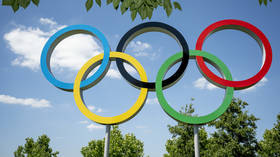Ukraine threatens Olympic boycott

Ukraine may opt to boycott the Paris Olympics in 2024 if Russian and Belarusian athletes are permitted to compete, the country’s Sports Minister Vadim Guttsait has warned.
The International Olympic Committee (IOC) this week said it was exploring options to reintegrate athletes from both countries into the Olympic fold, 11 months on from the IOC imposing sanctions actions Russia and Belarus following the onset of military action in Ukraine.
The Olympic Council of Asia (OCA) extended an invitation to Russia and Belarus to potentially compete in the Asian Games in September, which could provide a platform for athletes to participate in Olympic qualification events.
Russia has traditionally competed in the European qualification network but has been restricted from doing so as a result of the sanctions imposed by the IOC.
But the Ukrainian sports minister, who is also the President of the National Olympic Committee of Ukraine (NOCU), said he will lobby to ensure that Russian and Belarusian isolation from international sporting events continues.
“For the whole Ukrainian sports community, this is a question of principle!” he wrote on Facebook, via translation.
“In this, we are supported by both the President of our state, and all society.
“Part of the International Federations are outraged by the IOC’s efforts to promote the return of Russians and Belarusians.
“We have addressed and will address all international organizations that can influence the situation and whose opinions the IOC members can listen to.
“Our position is unchanged: as long as there is a war in Ukraine, Russian and Belarusian athletes should not be in international competitions!!!
“If we are not heard, I do not rule out the possibility that we will boycott and refuse participation in the Olympics.”
Ukrainian President Vladimir Zelensky detailed this week in a message on Telegram that he held a telephone call with French president Emmanuel Macron, in which he stressed that Russian and Belarusian athletes have “no place” in the French capital next year.
However, in a subsequent statement the IOC insisted that penalizing individual athletes due to their nationalities is contrary to the Olympic Charter.
Among the term outlined by the IOC for the eligibility of Russian and Belarusian athletes included a strict adherence to the World Anti-Doping Agency (WADA) code, as well as a declaration that athletes must maintain a stance of neutrality amid the ongoing conflict in Ukraine.
The IOC also stated that the sanctions against both governments must continue.
Following the IOC’s statement, figures in Moscow said that moves to reinstate Russian and Belarusian competitors was a step in the right direction – but again noted opposition to the sanctions as a whole.
“I perceive the information from the IOC as an attempt to take a step towards the athletes,” Russian Olympic Committee (ROC) President Stanislav Pozdnyakov said.
“But at the same time, unfortunately, it is also two steps in the opposite direction.
“In fact, [the] statement is an attempt to correct a mistake that has already resulted in groundless restrictions for Russian and Belarusian sports for almost a year and has caused great damage to all international sports.”











